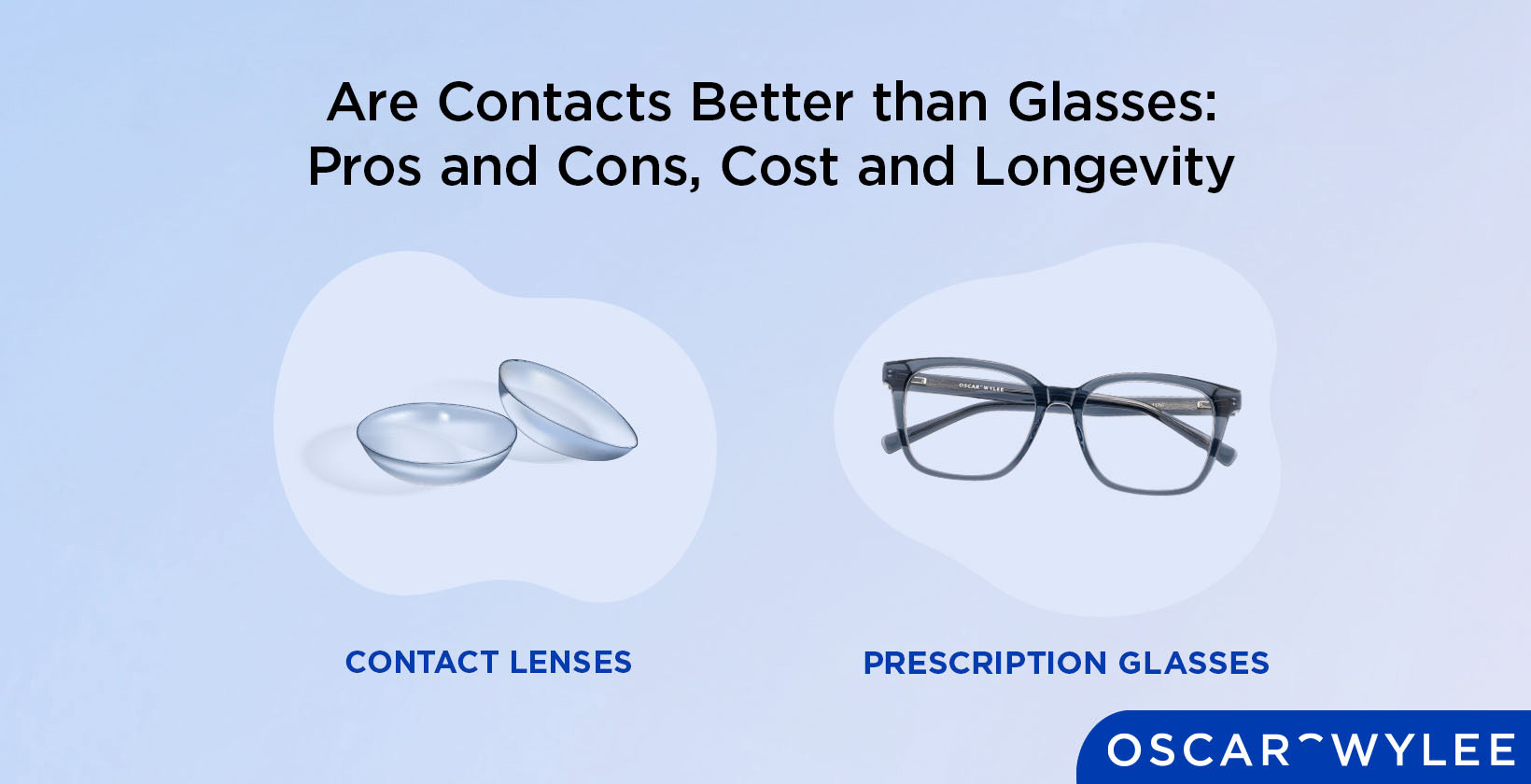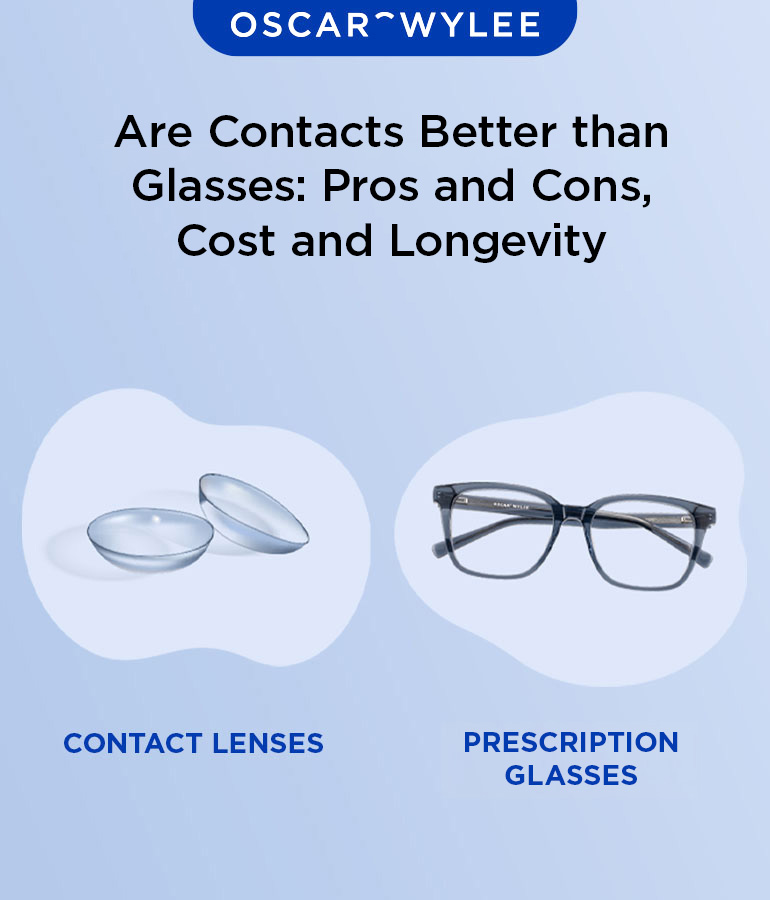Are Contacts Better than Glasses: Pros and Cons, Cost and Longevity
Published on May 20th, 2024
Updated on April 16th, 2025
Contact lenses and prescription glasses are both types of eyewear designed to help a person see clearer by correcting refractive errors. Refractive errors are eye conditions in which light does not hit the retina properly and include myopia, hyperopia, presbyopia and astigmatism. There are benefits to both contact lenses and eyeglasses, as the two are effective in correcting refractive errors. The benefits of contact lenses include convenience, a wide range of vision and their ability to be worn during sports. The benefits of prescription glasses are that they provide vision correction, and eye protection and are convenient in their way, as they require less care and preparation than contact lenses. Whether a person needs to wear contact lenses or glasses is up to the individual, their eye care and lifestyle needs, as well as the recommendation of an optometrist. Contact lenses are not suitable for everyone, as those with eye allergies, dry eyes, or recurring eye infections may find the lenses irritating. Keep reading to learn more about whether contact lenses or prescription glasses are the better eyewear choice.
Oscar Wylee does not sell contact lenses. We do however sell a range of prescription glasses, in a variety of styles, sizes and colours. Shop below.
What are Prescription Glasses?
Corrective eyeglasses, also known as prescription eyeglasses or optical glasses, are a type of glasses that have a prescription over the lens to help correct refractive errors. Refractive errors refer to eye conditions in which the shape of the eye prevents light from hitting the retina properly, leading to symptoms such as blurry vision. Types of refractive errors include myopia (nearsightedness), hyperopia (farsightedness), presbyopia and astigmatism. Prescription glasses will have a power over the lens that directs light onto the retina properly and helps a person to see clearer.
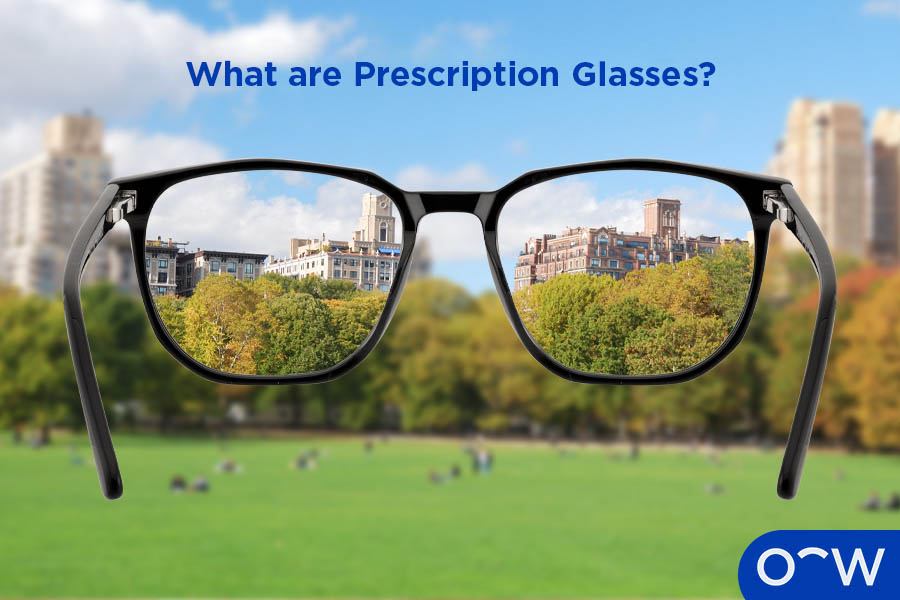

What are Contact Lenses?
Contact lenses are a thin lens that sits on top of the eye and helps to correct refractive errors such as myopia, hyperopia, presbyopia and astigmatism. According to Better Health Victoria, contact lenses are generally either soft, meaning they are made from a water-absorbing material that is flexible, or hard, meaning they are made from rigid gas-permeable plastic. There are also different types of contact lenses based on the length of time they are made to be worn. Extended-wear contact lenses are designed to be worn for an extended period, up to several days and nights depending on the brand. Daily or disposable contact lenses are designed to be worn for 1 day and are thrown away after 1 wear.
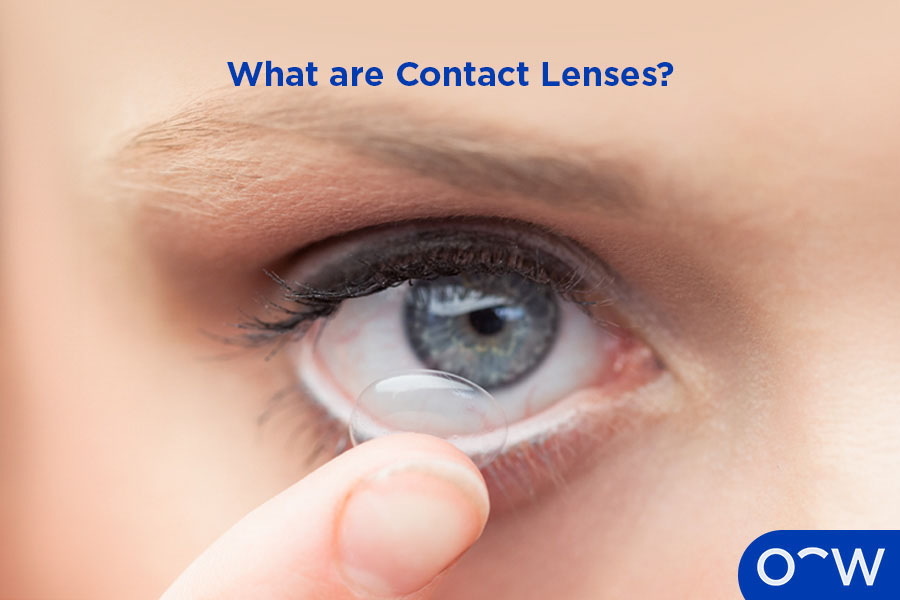

Do Contacts Work as Well as Glasses?
Yes, contact lenses work as well as glasses in terms of vision correction. It is ultimately up to personal preference when choosing between the two. Glasses are usually more comfortable, and easier to wear and there is a lessened risk of eye infections when worn. Contact lenses can be more convenient for a range of activities such as high-energy sports as they can be harder to damage, and are unnoticeable on the face as opposed to glasses. However, they come with an increased risk of eye infection and can be uncomfortable to take on and off.
Are Contacts Cheaper than Glasses?
Contacts in many cases are not cheaper than glasses. Once glasses are bought, there is little reason to replace them unless there is irreparable damage done, or you need a new prescription. This lessened the need for re-purchasing and allows glasses to be more cost-effective than contact lenses long term. Contact lenses have different replacement types, such as daily, weekly, or fortnightly. Depending on which type you get, they will have to be replenished at the appropriate time to ensure unhygienic contact lenses are not worn.
Are Glasses Better for Your Eyes?
Glasses are not necessarily considered better for your eyes as opposed to contacts. When worn correctly and maintained, contact lenses can be as good for your eyes as glasses are. It is ultimately down to personal comfortability and preference when it comes to eyewear choices.
What are the Pros and Cons of Contact Lenses?
The pros and cons of contact lenses include convenience, vision correction, wide range of vision, safe for sports, more care required, risk of eye infections and adjustment time. The pros and cons of contact lenses are listed below.
| Pros | Cons |
|---|---|
| Convenience Contact lenses are very convenient as the lens will generally not fall out or off the face like glasses might during higher intensity activity. Contact lenses are also convenient in the sense that they won't fog up or get blurry when it rains as glasses do. They are also very convenient when in the sun as you do not have to switch between non-prescription and prescription sunglasses, you can simply bring a pair of non-prescription sunglasses. |
More care required Contact lenses require more care when being used, as opposed to glasses that simply sit on the face. Your hands must be clean and contacts must be stored correctly. You will also have to clean the contacts if they are extended wear and use contact lens solution. |
| Vision correction Contact lenses provide vision correction, which is their main purpose and biggest benefit. Contact lenses can correct a variety of vision problems caused by refractive errors, such as myopia (nearsightedness), hyperopia (farsightedness) and astigmatism. |
Risk of eye infections Wearing contact lenses can increase a person’s risk of developing an eye infection. Eye infections may be caused by wearing contacts for longer than they are supposed to or not taking proper care of the lenses. |
| Wide range of vision A wide range of vision is another benefit of contact lenses. As contact lenses are placed on the eye rather than over the face like glasses, they offer a wider range of vision with less obstruction. Contact lenses also move with your eyes so there is a natural field of view. |
Can take time to adjust It can take time for a person to adjust to using contact lenses which may be a limitation to this form of eyewear. It may feel strange to have a lens sit on the eye or cause some minor discomfort. An optometrist may recommend that you start wearing contacts for only a few hours a day to get used to them. |
| Safe for sports Contact lenses are safe for sports, unlike glasses, as they will not fall off the face or get broken. Playing sports can be difficult and potentially dangerous while wearing glasses, which is why contact lenses are a great option as they do not get in the way and also don’t fog up. Contact lenses also provide a wider field of vision which is beneficial when playing sport. |
What are the Pros and Cons of Prescription Glasses?
The pros and cons of prescription glasses include vision correction, convenience and eye protection, unsuitability for certain sports and required upkeep. The pros and cons of contact lenses are listed below.
| Pros | Cons |
|---|---|
| Vision correction Vision correction is the primary purpose and biggest benefit of prescription glasses. Prescription or corrective lenses are designed to help people see clearer by correcting refractive errors. Prescription lenses help to focus light onto the retina properly, allowing people to see clearly. |
Not always suitable for sports Prescription glasses are not always suitable for sports in which there may be contact, such as soccer or basketball, as they may break. |
| Convenience The convenience of prescription glasses is one of their biggest benefits. Unlike contact lenses, glasses sit simply on the face and can be easily taken on and off whenever a person wants. |
Require Upkeep Prescription eyeglasses also require some upkeep, as they may need cleaning throughout the day. |
| Eye protection Eye protection is another benefit of prescription glasses. As well as providing vision correction, prescription glasses provide a barrier between the eyes and elements such as wind, as well as dust and dirt. Prescription lenses can also be applied to sunglasses, meaning they can provide protection from the sun and its UV rays. |
Should I Wear Glasses While Using the Computer Rather than Contacts?
A person can choose to wear glasses while using the computer rather than contacts if it feels better on the eyes. According to the American Academy of Ophthalmology, those who wear contact lenses and use digital devices for prolonged periods may get dry eye symptoms. In this case, a person can try taking a break and wearing glasses instead, to see if this alleviates dry eye symptoms. Blue light glasses are also available to wear whilst using a computer screen. Additionally, single-vision lenses or computer glasses may help reduce eye strain associated with prolonged periods of looking at a computer screen.
Do you Need Glasses Before Switching to Contacts?
It is not necessary to wear glasses before switching to contacts. However, many start by wearing glasses before trying contacts. They are often considered more comfortable as contacts can potentially not be compatible with certain eyes. You may like to consult an optometrist before trialling contact lenses.
Are Contact Lenses More Comfortable than Glasses?
Contact lenses can be more comfortable than glasses for certain people. They are unobtrusive, having no pressure on the nose, ears and face. They also allow for easier movement during physical activity. However, some may be sensitive to putting on and taking off contact lenses. They can also be incompatible with certain eyes and cause dry eye flare-ups.
Should I Try Contact Lenses Instead of Glasses?
You should try contact lenses instead of glasses if you find glasses are not compatible with your lifestyle. For example, if you participate in a lot of physical activity, you may be better suited to wearing contact lenses as they are unobtrusive and not going to move around on your face.
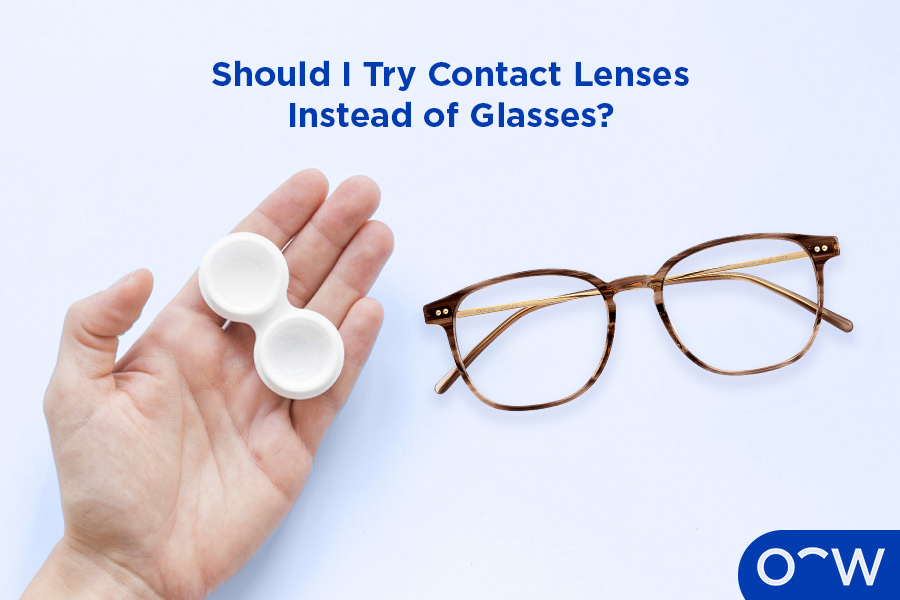

Can You Wear Contacts and Non-Prescription Glasses Together?
Yes, you can generally wear contacts and non-prescription glasses, such as sunglasses together. Prescription contact lenses are used to help correct refractive errors such as myopia, hyperopia and astigmatism, whereas non-prescription glasses will not have any prescription, and therefore, will not generally interfere with the vision correction. It might be beneficial for someone wearing contact lenses to also wear non-prescription glasses such as sunglasses when outside, for additional protection from UV light.
Are Glasses Better for Sports than Contacts?
Glasses are generally not considered better for sports than contacts. Because contacts are placed on the eye, they do not intrude on the face and can withstand sudden movements. However, if you would prefer to wear glasses you can try TR90 eyewear for greater impact resistance.
What Are the Risks of Wearing Contacts Compared to Glasses?
The risks of wearing contact compared to glasses include eye irritation, corneal ulcers and blurry vision. Read more on the risks of wearing contacts below.
- Eye irritation: Eye irritation can be a risk of contact lenses as their application can result in discomfort, dryness or allergic reactions especially if they are not worn or cleaned correctly.
- Corneal ulcers: Corneal ulcers are painful open sores on the cornea often caused by poor hygiene which can be a possibility if contact lenses are not worn correctly.
- Eye Infections: Eye infections are a potential risk of wearing contact lenses as improper use or not practising good hygiene with contact lenses can lead to bacteria getting into the eye.


